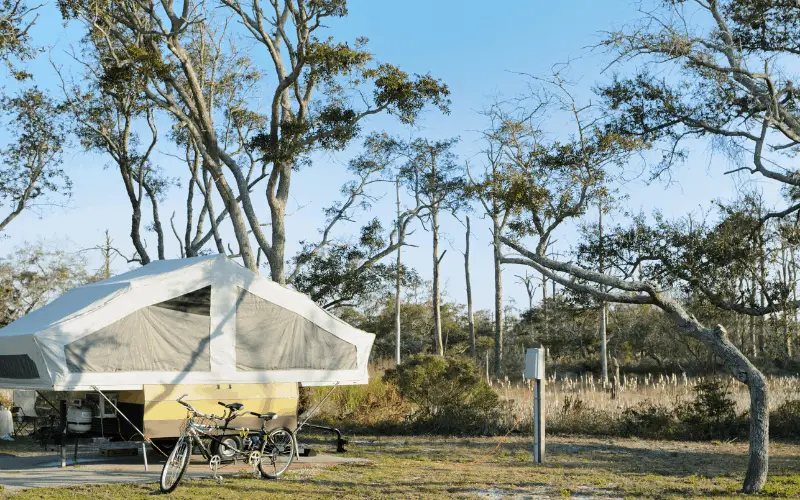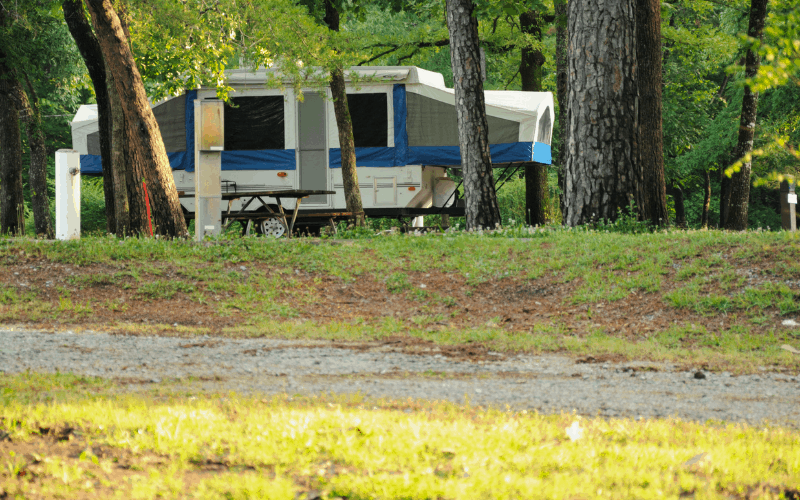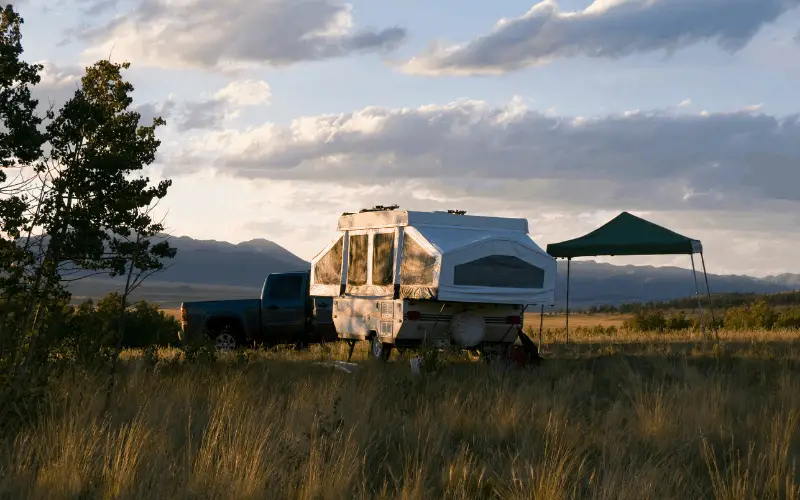Published Date: October 17, 2020
Last Updated on June 22, 2023 by Camper Front
The roof and sides of a pop-up camper, unlike travel trailers, motorhomes, or fifth wheels, can fold down, leaving little space for storage when the trailer is in tow. When the camper is open, clutter quickly becomes a problem.
It helps to tow with a truck that has a camper shell, or with a van that has plenty of storage space, so you don’t have to cram everything into the pop-up. But, if you tow with a smaller vehicle, here are some tips for storing a pop-up camper like a pro.
Table of Contents
Tips For Storing A Pop Up Camper
1. Snow Accumulation
Storing your camper on leveled ground can cause snow to become accumulated on top of it, especially if you are in a region that experiences heavy snow days.
When this accumulated snow is not removed immediately, it begins to melt on the top of the camper; this can be prevented by parking your camper in a somewhat slanted position so that the snow can slide right off it.
However, parking your camper in an unleveled position is not recommended when you have running appliances inside like a refrigerator.
2. Place Blocks Underneath The Tires
When there is heavy snowfall, placing blocks underneath the camper’s tires will help to keep the tires a little bit higher and also relieve them from pressure.
A high amount of snow adds to the camper’s weight and puts pressure on the tires. Ensure to park your camper properly then place jacks or blocks underneath them; this also helps to prevent the tires from sinking into the ground.
3. Use An RV Cover

Depending on the size of your RV, you might not be able to fully accommodate it in your garage, and renting a garage for your camper might not be budget-friendly.
So you would be forced to store it outside, in order to prevent your camper from harsh weather conditions, it is recommended to cover it with a breathable cover, while there’s a lot of debate on whether to cover an RV or not, covering an RV is actually more beneficial.
But you want to be conscious about the type of covering you are making use of; covering your camper with a tarp can be very bad as it does not provide for any air circulation.
Using tarp covering can also result in wear and tear at the edges of the camper, so if you must cover your camper, make sure to use a breathable one.
4. Store A Wet Canvas
Storing a wet canvas can result in so many issues; you want to make sure your canvas is completely dried before storing it. Storing wet canvas results in mold, mildew, and other issues.
5. Use Mothballs
Placing some mothballs in some strategic areas of your camper will help to keep rodent infestation at bay. Mothballs also helps to keep your camper smelling good, so it doesn’t develop any musty smell when you keep your camper in storage for some time.
However, for mothballs to be fully effective, you will need a little bit of air circulation, so you might have to leave some windows slightly open.
6. Moisture Absorbers
Storing your camper for a long time can put it at risk of moisture buildup, and if you don’t take immediate action, the moisture starts to aid the growth of mold and mildew.
Luckily there are different moisture-absorbing products in the market you can easily purchase; placing a moisture-absorbing product inside your camper will help to get rid of any moisture buildup.
7. Prevent Rodent Infestation
Even if you are going to store your camper inside a garage, you want to mouse-proof it. You want to inspect your camper from the sides and seal off any openings immediately; you find them because even the tiniest hole can give access to insects and rodents, which can enter your camper and totally destroy it.
Also, when planning to store your camper for a long time, you want to remove every food particle or dirty dish as they can attract rodents into your camper.
8. Uninstall Your Battery
Storing your camper with your battery in it can cause it to lose its charge faster, compared to if you stored it separately.
Even while storing your battery separately, you want to keep an eye on the charge level as Batteries start losing charge even in storage and that can be as high as 5% to 8% per month, so keep an eye on the battery charged and recharge it to its full percentage anytime it gets low.
9. Clean Out The Camper
If your camper is going to be parked up in one place for weeks and even months, it is best if you give it a thorough cleaning before leaving.
This way, you don’t have too much cleaning to do when you return to it, plus it also deters the infestation of insects and rodents as stated above.
You want to clean the camper’s canvas gently with the recommended cleaner and do not over-saturate it with water to avoid damaging its waterproofing abilities.
10. Leave Your Refrigerator Door Open
This is a very useful tip, especially if you are shutting down the camper totally and storing it away for months. Leaving the refrigerator door open will prevent odor from forming inside, but this comes at a price.
To avoid having your refrigerator turned into a haven for rodents, you will need to frequently check on the camper; otherwise, if rodents have access to the camper, then that can be very bad as they will make things worse.
11. Cover RV Tires

This is a great tip that will save you the stress of probably having to change your camper’s tires. Covering your camper tires helps to protect them from mice bites, sunlight, and UV rays; it also helps them to retain their strength.
12. Running Antifreeze Through The Plumbing Lines
This is a commonly used way to winterize campers and protect the plumbing lines from exploding when it freezes.
Antifreeze, as the name implies, prevents freezing and can be easily purchased online or at any retail shop; however, many people complain of the terrible taste that is left in their water lines after the use of antifreeze.
Although it is recommended to thoroughly flush your plumbing lines with water after running antifreeze through it, it still takes some time for the taste to be completely washed off.
Winterizing, however, is a great way to protect your camper from the wrath of freezing cold; you can see a step by step tutorial on how to winterize your camper here.
13. Frequently Check Up On Your Camper
Even after following all the tips for storing a pop up camper listed here to the letter, neglecting your camper will void all of your efforts.
Try to check up on your camper as frequently as possible; check it is interior and exterior regularly for any irregularities; the same goes with separately stored items like batteries and generators. This way, you can nip any arising problem in the bud before it becomes widespread or too late.
Read Also: Learn How to De-Winterize a Camper
Conclusion
While the pop-up camper might be the smallest sibling in the RV family, it doesn’t make storing it any less easy. With these few tips for storing a pop-up camper, you are sure to come back and meet your camper in good shape and ready to use for your next camping trip.

